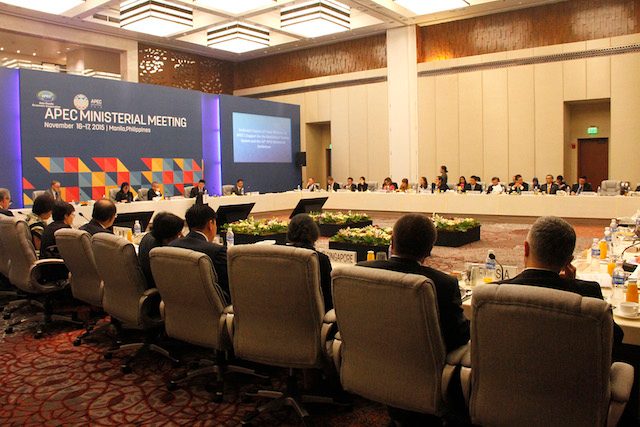SUMMARY
This is AI generated summarization, which may have errors. For context, always refer to the full article.

MANILA, Philippines – Ministers of Asia-Pacific Economic Cooperation (APEC) member economies have agreed to endorse an action plan that would help protect the region’s food supply by deterring illegal and unregulated fishing, the co-chair of the 27th APEC Ministerial Meeting (AMM) said on Tuesday, November 17.
The ministers also agreed to pursue “strategic cooperation” on human resource capital development, Foreign Secretary Albert del Rosario said in a news briefing at the end of the 27th AMM which he co-chaired with Trade Secretary Gregory Domingo.
“We endorsed an action plan on food security and blue economy, which will help ensure the security of the region’s food supply by addressing illegal, unregulated, and unreported fishing, among others,” Del Rosario said.
Asked whether the ministers’ discussions included conflicting claims in the South China Sea (West Philippine) and the concerns of Filipino fishermen, for example, who are prevented by China from fishing in Philippine waters, the Cabinet official said, “The APEC agenda did not include any item on the South China Sea (West Philippine Sea).”
In February, the Philippines filed two diplomatic notes against China for ramming 3 Filipino vessels and collecting giant clams at the contested Panatag (Scarborough) Shoal, also known in the Philippines as Bajo de Masinloc.
Another APEC member economy, Vietnam, had slammed China when the latter’s vessel used a water canon to “attack” Vietnamese fishermen in disputed waters near the flashpoint Paracel Islands in June.
In their joint statement, the ministers “commit to enhance efforts to ensure the security of the region’s food supply and sustainable agricultural and water management.”
“We call on member economies to highlight the critical roles of investment and infrastructure development for food access and support economies’ efforts to achieve sustainable food security and improved nutrition of low-income groups,” the joint statement said.
“We will ensure that all citizens have access to food through the reduction in waste and loss along the food value chain, agribusiness promotion, market development, and open and fair trade that enables the integration of small scale farmers, fishers, and fish farmers into global food value chains and improve the livelihood of coastal communities,” it added.
‘Develop 21st century skills’
Del Rosario said the ministers “strongly agreed that we must enhance human resource development.”
“To that end, we agreed to pursue strategic cooperation in human capital development geared towards developing 21st century skills that will increase peoples’ employability, productivity and ability to respond to emerging business demands,” he said.
Discussions during the two-day meeting were on “how to widen APEC’s reach and impact,” in keeping with the APEC 2015 theme, “Building Inclusive Economies, Building a Better World.”
During the AMM, the APEC ministers also:
- Urged that science, technology and innovation, and higher education be placed at the forefront of economic policy-making and strategic planning
- Considered issues related to health and women’s empowerment
- Considered the need to develop strategic and broad-based approaches to address environmental impact
- Emphasized the importance of building energy resilience and agreed on a task force to work towards increasing resiliency of our energy infrastructure from natural disaster and climate change through enhancing quality electric power infrastructure
- Said they are working on achieving the APEC aspirational target of reducing aggregate energy intensity by 45% from 2005 levels by 2035, through collaboration on energy-efficient and low carbon development
- Endorsed the APEC’s Disaster Risk Reduction Framework to facilitate collective work in building adaptive and disaster-resilient economies that support inclusive and sustainable development
2 major achievements
Del Rosario also cited the two major achievements of APEC developed under the chairmanship of the Philippines.
The first, he said, “is the agreement to an APEC Services Cooperation Framework to promote services and form efforts in APEC and the Philippines.”
Del Rosario explained that the framework will develop a Services Competitiveness Roadmap “to improve trade and investment in services over the next 10 years.”
“This work is vital because we know that every one million dollars of services exports generates 105 jobs. Whereas goods, exports generate only 59 jobs for the same amount. Not only the services trade create new jobs but it allows people from all parts of the economy to participate in the economic and social mainstream,” he said.
He added that in the Philippines, services account for more than 50% of the total gross domestic product in a given year.
The second achievement, Del Rosario said, is the agreement on APEC’s strategy for strengthening quality growth.
“The strategy focuses on institution building through governance, social cohesion and environmental impact of economic activities as key accountability areas for each economy,” Del Rosario explained.
“It underscores how quality growth is not just about economic well-being of every individual and of every economy but also about how growth can be sustained over the medium to long term through a whole of economy approach,” he added. – Rappler.com
Add a comment
How does this make you feel?
There are no comments yet. Add your comment to start the conversation.